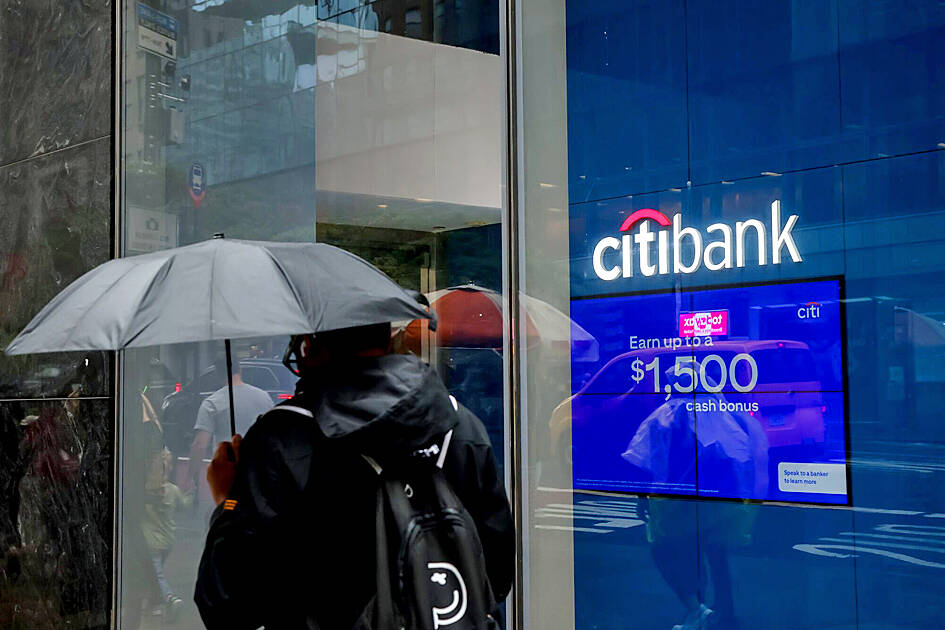Stocks yesterday fell as losses in US lenders deepened, with doubts over regional banks’ health prompting traders to cut risk at the end of a volatile week. Bonds and haven currencies were major beneficiaries, as investors rushed for safety.
The S&P 500 looked set for a second day of losses, with index futures down 1 percent, as US banking stocks extended their slide in premarket trading. Bank of America Corp, Citigroup Inc, Morgan Stanley and Wells Fargo & Co slid more than 1.5 percent. Deutsche Bank AG slumped more than 6 percent in Frankfurt.
Meanwhile, Wall Street’s chief fear gauge, the Cboe Volatility Index, or VIX, jumped to its highest level since US President Donald Trump roiled markets in April with his tariff policies.

Photo: Bloomberg
Risk measures for Europe’s credit market rose, with an index tracking credit default swaps on senior bank bonds up as much as 3.2 basis points, the most in almost a month. A similar gauge that tracks CDS contracts for subordinated bank debt climbed the most in a week.
US Treasuries added to Thursday’s gains, with 10-year yields falling 2 basis points to 3.96 percent. Gold fluctuated, while the yen and Swiss franc led advances among major currencies against the US dollar.
The moves underscored growing concerns about the US credit market, offering the clearest sign yet of the nervous undercurrents running through Wall Street. They add to a mounting list of investor worries, from the US government shutdown to fears of an artificial intelligence bubble and renewed US-China trade tensions.
“This very much looks like end-of-cycle symptoms, where we can see hints of complacency in lending standards,” said Raphael Thuin, head of capital markets strategies at Tikehau Capital. “With this year’s rally and costly valuations, the temptation to take profits and secure year-to-date gains is high.”
As the fallout from the collapse of auto-parts supplier First Brands Corp ripples through the lending industry, short interest in the SPDR S&P Regional Banking ETF has risen to 30 percent of shares outstanding, from 18.4 percent on Oct. 8, data compiled by S&P Global Market Intelligence showed.
Among the biggest decliners in European bank bonds yesterday were JPMorgan’s euro-denominated securities due January 2036, which fell about 0.5 percent, the most since early last month, and Barclays PLC’s bonds due 2035, which dropped the most in about three weeks.
Some analysts downplayed yesterday’s moves as an overreaction rather than a sign of systemic risk, calling comparisons to the start of the financial crisis overblown.
“Today’s move on European banks is purely a knee-jerk reaction, as there are currently a lot of reasons to sell them: falling interest rates, political risk and the fact they rallied so much this year,” said Jerome Legras, head of research at Axiom Alternatives Investments. “I was there in 2007 and I can tell you that this is absolutely nothing like it.”

RECYCLE: Taiwan would aid manufacturers in refining rare earths from discarded appliances, which would fit the nation’s circular economy goals, minister Kung said Taiwan would work with the US and Japan on a proposed cooperation initiative in response to Beijing’s newly announced rare earth export curbs, Minister of Economic Affairs Kung Ming-hsin (龔明鑫) said yesterday. China last week announced new restrictions requiring companies to obtain export licenses if their products contain more than 0.1 percent of Chinese-origin rare earths by value. US Secretary of the Treasury Scott Bessent on Wednesday responded by saying that Beijing was “unreliable” in its rare earths exports, adding that the US would “neither be commanded, nor controlled” by China, several media outlets reported. Japanese Minister of Finance Katsunobu Kato yesterday also

Taiwan’s rapidly aging population is fueling a sharp increase in homes occupied solely by elderly people, a trend that is reshaping the nation’s housing market and social fabric, real-estate brokers said yesterday. About 850,000 residences were occupied by elderly people in the first quarter, including 655,000 that housed only one resident, the Ministry of the Interior said. The figures have nearly doubled from a decade earlier, Great Home Realty Co (大家房屋) said, as people aged 65 and older now make up 20.8 percent of the population. “The so-called silver tsunami represents more than just a demographic shift — it could fundamentally redefine the

China Airlines Ltd (CAL, 中華航空) said it expects peak season effects in the fourth quarter to continue to boost demand for passenger flights and cargo services, after reporting its second-highest-ever September sales on Monday. The carrier said it posted NT$15.88 billion (US$517 million) in consolidated sales last month, trailing only September last year’s NT$16.01 billion. Last month, CAL generated NT$8.77 billion from its passenger flights and NT$5.37 billion from cargo services, it said. In the first nine months of this year, the carrier posted NT$154.93 billion in cumulative sales, up 2.62 percent from a year earlier, marking the second-highest level for the January-September

‘DRAMATIC AND POSITIVE’: AI growth would be better than it previously forecast and would stay robust even if the Chinese market became inaccessible for customers, it said Taiwan Semiconductor Manufacturing Co (TSMC, 台積電) yesterday raised its full-year revenue growth outlook after posting record profit for last quarter, despite growing market concern about an artificial intelligence (AI) bubble. The company said it expects revenue to expand about 35 percent year-on-year, driven mainly by faster-than-expected demand for leading-edge chips for AI applications. The world’s biggest contract chipmaker in July projected that revenue this year would expand about 30 percent in US dollar terms. The company also slightly hiked its capital expenditure for this year to US$40 billion to US$42 billion, compared with US$38 billion to US$42 billion it set previously. “AI demand actually